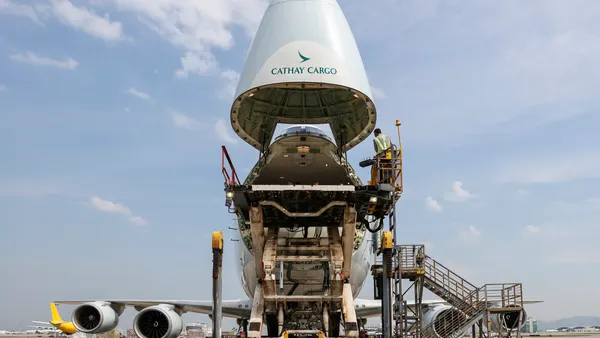Dive Brief:
- Peloton will incur transportation costs more than 10 times its usual cost per item, CEO John Foley said in a note to customers. The manufacturer aims to expedite bike and treadmill deliveries to consumers frustrated by delayed orders.
- The company will spend $100 million to speed shipping, including using airfreight, expedited ocean freight, moving containers to less-congested ports and getting products into U.S. warehouses, executives said on the company's earnings call Thursday.
- Peloton is also investing in U.S. manufacturing capacity to decrease lead times and circumvent costly transportation. It acquired fitness equipment manufacturer Precor and expects to produce Peloton equipment in Precor's North Carolina facility by the end of 2021, executives said.
Dive Insight:
For one analyst on Peloton's earnings call, the question was, why now? Why did Peloton not expedite shipping two quarters ago, as consumer complaints about delayed deliveries peppered message boards and social media for months?
"Six months ago we looked at it, and it wouldn’t have helped," Peloton President William Lynch said in response. "We were building the backlog. ... It takes a while to ramp source components and everything that goes into the production of our fitness equipment."
At that time, executives said Peloton had doubled production capacity, but they didn't expect order-to-delivery times to normalize until this year. The company struggled to catch up to elevated demand, as consumers invested in home fitness.
Now the fitness company said it has increased manufacturing capacity by six times in the last 12 months. It acquired one of its third-party manufacturers in Taiwan and broke ground on a new plant in the country.
"We're now making more bikes on a monthly basis than we did in all of fiscal 2018," Foley said.
Now the order-to-delivery issues have shifted from the order side of the equation to delivery. Peloton executives pointed to West Coast port congestion as one of the reasons for the delays.
Part of Peloton's $100 million transportation spend will go toward air shipping, and it also accounts for increased container freight rates from Asia to the West Coast. Rates on the route are $4,334, nearly triple the price this time last year of $1,486, according to Freightos. Capacity has been constrained in the ocean freight market, and analysts foresee the airfreight market remaining tight, as well.
CFO Jill Woodworth called the $100 million spend "a very large investment" but noted shipping costs are only 2% to 3% of Peloton's total cost of goods sold. "So, that could persist for months and months and months. And that’s easy for us to absorb from a margin perspective," Woodworth said on the call.
The shipping costs will come down even further as Peloton sets up domestic manufacturing capacity. Woodworth said Peloton's "outsized" transportation costs would subside by June as it builds inventory in the U.S.
"It’s great for costs, as you think about the transportation," Foley said, referring to manufacturing in the U.S. "It's great for flexibility where we don’t have to come through the ports if there’s congestion."
Manufacturers of bulky or industrial products, in particular, have expressed interest in reshoring, because it offers reduced lead times and lower freight costs for heavy items that are costly to ship.
Peloton executives acknowledged they will continue to use standard ocean freight, and shipping bikes and treadmills by air will not be a permanent shift.
"These unprecedented measures are for these unprecedented times," Foley wrote in his note to consumers.













